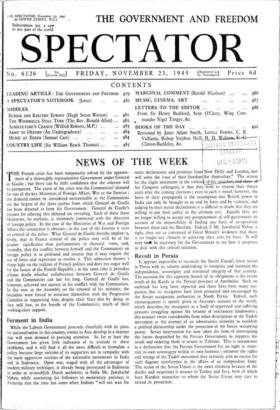Revolt in Persia
It appears impossible to reconcile the Soviet Union's latest action in Persia with its solemn undertaking to recognise and maintain the independence, sovereignty and territorial integrity of that country. The occasion for this apparent breach of its obligations is the recent revolt of the Kurds in the Persian province of Azerbaijan. Such an outbreak has long been expected and there have been many sus- picions that its instigators have been protected and encouraged by the Soviet occupation authorities in North Persia. Indeed, such encouragement is openly given in Izvestia's account of the revolt, which describes the insurgents as a body of oppressed and suffering peasants struggling against the tyranny of reactionary landowners ; this account varies considerably from other descriptions of the Tudeh movement as the attempt of an adventurous minority to establish a political dictatorship under the protection of the Soviet occupying power. Soviet intervention has now taken the form of intercepting the forces despatched by the Persian Government to suppress the revolt and ordering them to return to Teheran. This is tantamount to a declaration that the Persian Government has no right to main- tain its own sovereignty within its own frontiers ; whatever the rights and wrongs of the Tudeh movement they certainly give no excuse for such flagrant interference in the affairs of an independent State. The action of the Soviet Union is the more alarming because of the doubts and suspicions it arouses in Turkey and Iraq, both of which have Kurdish minorities to whom the Soviet Union may care to extend its protection.


























